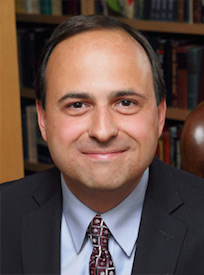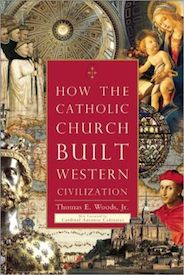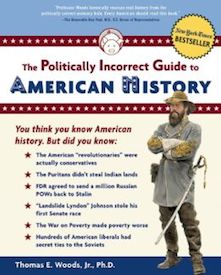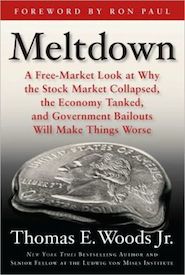How the Catholic Church Built Western Civilization
Ask a college student today what he knows about the Catholic Church, and his answer might come down to one word: “corruption.” But according to Thomas E. Woods, Jr., that one word should be “civilization.” In “How the Catholic Church Built Western Civilization,” Professor Woods shows how the Catholic Church has shaped our civilization to a far greater degree than most people — Catholics included — have been taught. “To be sure, most people recognize the influence of the Church in music, art, and architecture,” writes Woods (author of the New York Times bestseller The Politically Incorrect Guide to American History). But her influence goes far beyond that. In fact, he reveals, the Church’s imprint can be found on every major achievement and institution of the West — from science and economics, to international law and “just war” theory, to the university system and organized charity.
And, because Woods focuses primarily on the pre-Reformation medieval period, Protestants no less than Catholics should be cheered by this vigorous defense of their common patrimony.
In How the Catholic Church Built Western Civilization, you’ll learn:
- How, far from inhibiting the development of science, the Church played an indispensable role in fostering it
- How the idea of a rational, orderly universe — fundamental to the Catholic worldview, but absent in non-Christian cultures — made possible the flowering of science in West
- How it was in “Dark Age” Europe that the university system, a gift of Western civilization to the world, was developed by the Catholic Church under the patronage of the papacy
- How the early universities’ commitment to rigorous and rational debate provided the framework for the Scientific Revolution, which was unique to Western civilization
- How the Catholic contribution to science went well beyond ideas to accomplished practicing scientists, many of whom were priests — including the “fathers” of geology, modern atomic theory, seismology, and other sciences
- How the Catholic Church’s contributions to astronomy exceed that of any other institution from the recovery of ancient learning during the late Middle Ages into the Enlightenment
- How 16th-century Catholic theologians in Spain — and not Adam Smith two centuries later — were the real founders of modern economics. How they set forth accurate theories of value, price, government intervention, monopoly, entrepreneurship, and money and banking — while avoiding Smith’s errors, such as his mistaken labor theory of value
- How the Western idea of international law, though often attributed to Enlightenment thinkers, comes from 16th-century Catholic theologians, and was rooted in the Christian conception of the fundamental unity of the human race
- Why Western law itself is very largely a gift of the Church — derived from Canon Law, the first modern legal system in Europe
- How Catholic churchmen introduced rational trial procedures and sophisticated legal concepts in place of the superstition-based trials by ordeal that had characterized the Germanic legal order
- How the idea of universal human “rights” comes not from John Locke and Thomas Jefferson, but from Catholic canon law
- “Just War” theory: how this indispensable tool of moral analysis originates with the Church
- How, inspired by Christ, the Church’s commitment to the poor — both its spirit and sheer scope — constituted something new in the Western world and represented a dramatic improvement over the standards of classical antiquity
- How English drama — the greatest since the ancient Greeks — grew out of the tropes, the liturgical dramas that originated in the context of the Catholic Mass
- How, when the Roman Empire gave way to a hodgepodge of barbarian kingdoms, the Church rebuilt the West out of the ruins, and preserved what was best from classical antiquity
- The monks: everyone knows they copied books and preserved literacy, but how many people know they taught medieval Europeans agriculture, metallurgy, the brewing of beer — and much more besides?
- Why one historian goes so far as to declare: “Saint Benedict [the architect of Western monasticism] was the Father of Europe. The Benedictines, his children, were the Fathers of European civilization”
- How recent scholarship has definitively revised in the Church’s favor some historical episodes traditionally cited as evidence of the Church’s benightedness or wickedness — including the Inquisition and the Galileo affair
- How the Church humanized the West by insisting on the sacredness of all human life, overturning such morally repugnant aspects of the ancient world as infanticide and gladiatorial combats
“Engaging and engrossing, How the Catholic Church Built Western Civilization is a mine of information and a stimulus for reflection on the debt we owe to Catholic life and thought.” — Michael P. Foley, Ph.D., assistant professor of Patristics, Great Texts Program, Baylor University
“Dr. Woods’s book is a superb and scholarly refutation of the widespread and deeply rooted prejudice that the supernatural outlook of the Roman Catholic Church disqualifies Her to make any valuable contribution to the ‘progress’ of humanity. This book is a magnificent illustration of Christ’s saying: ‘Seek ye first the Kingdom of God and His justice; the rest will be added unto.’ Whether we turn to science, legal questions, economics, education, scholarship, fine arts, Dr. Woods shows convincingly the fecundity of a supernatural approach to life. This book is highly recommended.” — Dr. Alice von Hildebrand, professor emeritus, the City University of New York
“Professor Thomas Woods has put the Catholic Church squarely back where it should be: at the center of the development of the values, ideas, science, laws, and institutions which constitute what we call Western civilization. I recommend Professor Woods’s book not only to anyone interested in the history of the Catholic Church, but also to any student of the history and development of Western civilization.” — Dr. Paul Legutko, Stanford University
Tags: How the Catholic Church Built Western Civilization, Thomas Woods
- The Author

Thomas E. Woods Jr.
Thomas E. Woods Jr. is a senior fellow at the Ludwig von Mises Institute in Auburn, Alabama. He is the […] More about Thomas E. Woods Jr..
- Books by the Author
Ratings Details
















